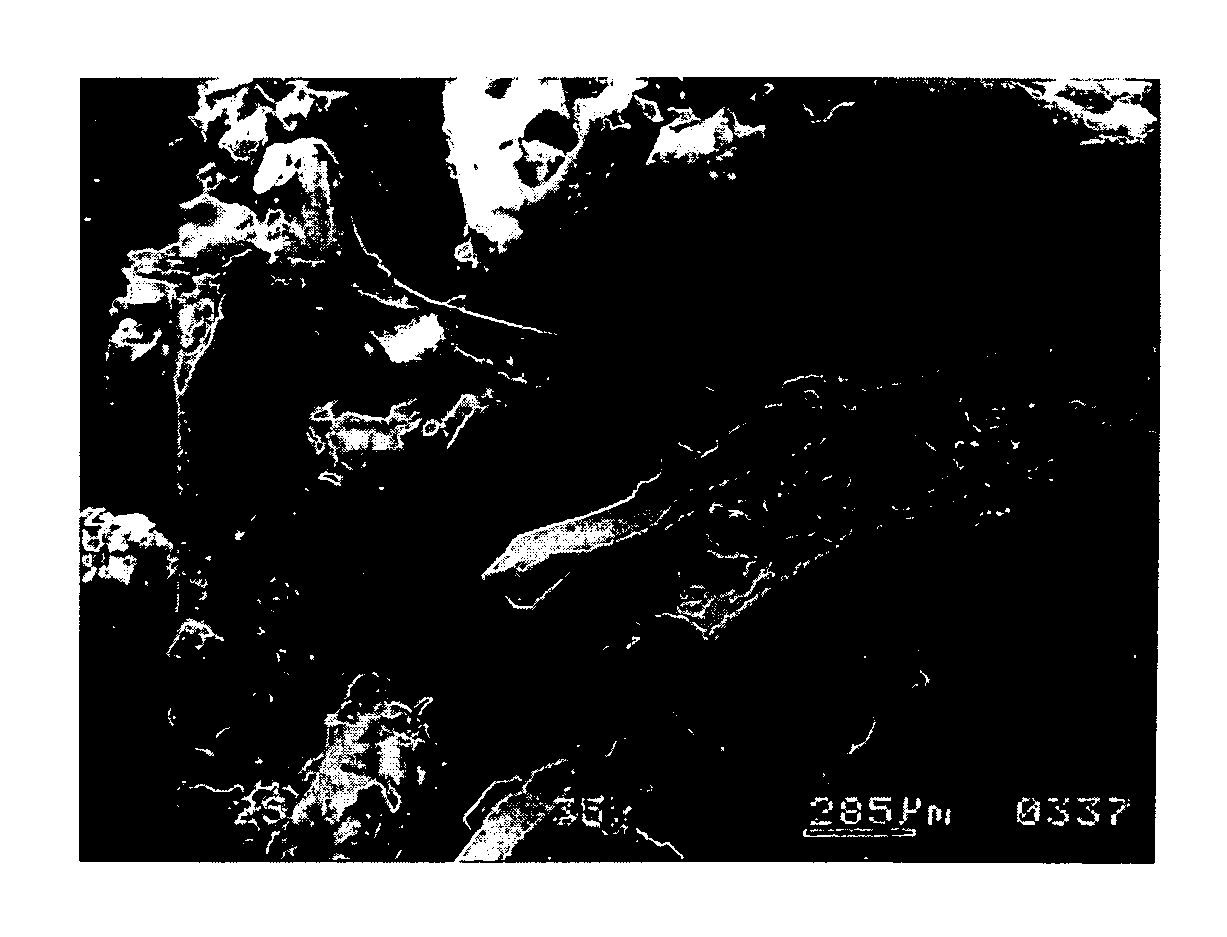Abrasive tools having a permeable structure
a permeable structure and abrasive tool technology, applied in the field of grinding operations, can solve the problems of insufficient friability, more costly manufacturing of tg2 grains than most blocky or sphere shaped grains, etc., and achieve the effect of ensuring the surface finish and without compromising the surface-finish quality or structural openness of the resultant produ
- Summary
- Abstract
- Description
- Claims
- Application Information
AI Technical Summary
Benefits of technology
Problems solved by technology
Method used
Image
Examples
example 1
Preparation of Abrasive Wheels with a Blend of Two Agglomerate Feedstocks
[0077]Various combinations of an agglomerate of filamentary sol-gel abrasive grain and agglomerated abrasive grain granules were prepared for experimental abrasive grinding wheels, as described in Table 1. Herein, “TG2 ” represents an example of a filamentary, seeded sol-gel alumina abrasive grain obtained from Saint-Gobain Abrasives in Worcester, Mass. Norton®38A fused alumina abrasive grain which are available from the same company were used for the agglomerated abrasive grain granules (hereinafter “38A”).
[0078]A set of experimental wheels was formulated with different ratios of TG2 grain to agglomerate of 38A grain. Such wheels having a blend of a filamentary sol-gel alumina abrasive grain, or an agglomerate thereof, and agglomerated abrasive grain granules are hereinafter referred to “agglomerated grain-TG2” type wheels. Four agglomerated grain-TG2 wheels (20)-(23) were made with overall amounts of 10, 30, ...
example 2
Mechanical Properties of Abrasive Wheels of Example 1
A. Elastic Modulus (Emod)
[0086]All data concerning Emod were measured by a Grindosonic machine, by the method described in J. Peters, “Sonic Testing of Grinding Wheels,”Advances in Machine Tool Design and Research, Pergamon Press, 1968.
[0087]Physical properties of agglomerated grain-TG2 wheels (20)-(23) are presented in Table 2 below and compared against standard agglomerated grain wheels (24); standard TG2 wheels (25) and (26); and conventional standard wheels (27) and (28). As shown in Table 2, the elastic moduli of standard TG2 wheels (25) and (26) were similar to that of standard 38A-60 wheel (28). The elastic modulus of standard TG2 wheels (26) was the highest value among those of the tested wheels. Agglomerated grain wheel (24) quite unexpectedly featured up to about 40% elastic modulus reduction as compared with TG2 wheels (25) and (26). Interestingly, the elastic moduli of agglomerated grain-TG2 wheels (20)-(23) ranged fro...
example 3
Grinding Performance of the Abrasive Wheels of Example 1
[0095]Agglomerated grain-TG2 wheels (20-23) of Example 1 were tested in creepfeed grinding operations against the comparative commercial wheels, (25),(26) and (27), recommended for use in creepfeed grinding operations. Agglomerated grain wheel (24) (laboratory sample) and a commercial agglomerated grain wheel (29) obtained from Saint-Gobain Abrasives, Inc., Worcester, Mass., were also tested as control wheels.
[0096]Creepfeed grinding is a low force grinding (large surface of contact) application commonly used for high material removal and burn sensitive materials. Three major product characteristics make a creepfeed wheel grinding better: i) low grinding power; ii) low burn sensitivity; and iii) low dress compensation. Reducing grinding power can allow grinding at a higher removal rate. Reducing burn sensitivity can also allow grinding at a higher removal rate. Reducing dress compensation while maintaining high removal rate and...
PUM
| Property | Measurement | Unit |
|---|---|---|
| porosity | aaaaa | aaaaa |
| size | aaaaa | aaaaa |
| diameter | aaaaa | aaaaa |
Abstract
Description
Claims
Application Information
 Login to View More
Login to View More - R&D
- Intellectual Property
- Life Sciences
- Materials
- Tech Scout
- Unparalleled Data Quality
- Higher Quality Content
- 60% Fewer Hallucinations
Browse by: Latest US Patents, China's latest patents, Technical Efficacy Thesaurus, Application Domain, Technology Topic, Popular Technical Reports.
© 2025 PatSnap. All rights reserved.Legal|Privacy policy|Modern Slavery Act Transparency Statement|Sitemap|About US| Contact US: help@patsnap.com

